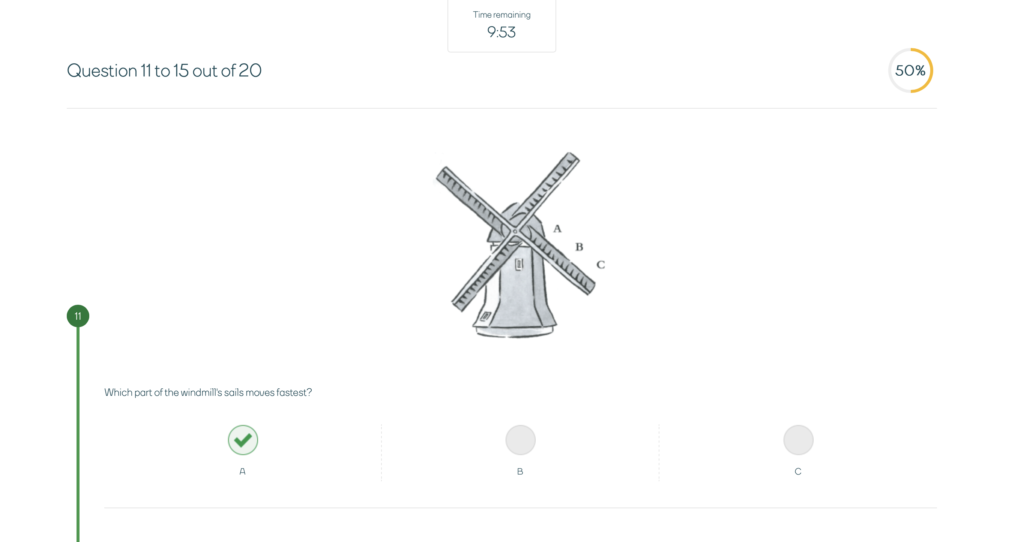Cognitive Ability Test
Mechanical Reasoning Test
A quick and easy way to test candidates' mechanical and technical ability.
Home » Platform » Assessments » Mechanical Reasoning Test





















Clevry Mechanical Reasoning Test
Easily assess a candidate’s ability to deal with mechanical or technical concepts.
The Clevry Mechanical Reasoning Test makes it easy to assess your candidates’ mechanical ability and see how well they understand mechanical and technical concepts such as the operation of levers, pulleys, gears and other mechanical processes. Candidates will need to apply basic principles of physics in order to deduce what will happen in the image presented.
Developed by our team of in-house business psychologists, all Clevry tests are built to adhere to rigorous guidelines published by the British Psychologists’ Associations (BPA), meaning our mechanical ability tests can be trusted to have high validity.
Select from one of our off-the-shelf norm groups to easily compare your candidates against global benchmarks, or create your own.
Time limit:
12 minutes
Questions:
20
Ave. completion time:
8 minutes



Mechanical Reasoning Test
Mechanical testing for every level
Provides a fairer and more objective measure of candidates' ability to work mechanical or technical information, and see how well they apply the laws of physics to the information provided.
Gain deeper insights into how candidates interact with complex information in a workplace context and make better hiring decisions.


Better candidate experience
Use your own company branding
Improve the candidate experience by adding your own company logo and branding to our platform to give your candidates a seamless recruitment experience.
Easily build your own assessment campaigns by choosing from our library of off-the-shelf psychometric assessments, or work with our team of occupational psychologists to develop custom built assessments tailored to your organisational framework or specific roles.
Abstract reasoning tests led by science
Industry leading platform
The Clevry assessment platform provides powerful insights into your candidates’ personality, ability and motivational drivers within the workplace. Gain a more well-rounded view of your future talent and their ability to perform in the role.
One personality test yields a range of useful psychometric reports including personality profiles, onboarding reports, team strengths and leadership reports so your new recruits can hit the ground running.
Our assessment division was originally founded as Criterion Partnership in 1991 by Richard Hunter, who prior to this co-built the OPQ at SHL.
Clevry’s personality and cognitive ability tests are based on rational model which means all our psychometric assessments have the highest predictive validity of different psychometric tests.
- Measuring distinct elements of personality (traits), not broad domains. Shows “strength of preference” on a scale, rather than categorising people on one side or another.
- Find our scale library here.
- Candidates’ responses are always compared to a norm group.
- High levels of reliability and validity.
- Accredited by The British Psychological Society.
Mechanical reasoning ability tests provide an unbiased and equitable approach to evaluating candidates, focusing on their technical and mechanical ability, and how well they apply the laws of physics to specific scenarios and situations.
Automated scoring mitigates the potential for bias associated with gender, ethnicity, or other demographic factors, ensuring a fair and impartial hiring process.
Mechanical reasoning tests are particularly beneficial for roles where candidates will need to work with and understand mechanical or technical concepts. Using a multiple-choice format under timed conditions, candidates are presented with illustrations of mechanical processes such as gears, levers, and hydraulics and will need to apply basic principles of physics and mechanical devices to deduce what will happen in the picture. This saves time and resources and aids organisations in identifying individuals with the appropriate mechanical reasoning skills essential for success in the role.
With automated scoring, the reliance on manual efforts is minimised, ensuring a consistent and unbiased evaluation process. This automated approach frees up recruiters to focus their time on interpreting results and engaging with candidates who display the required skills for the role.
The scalability of our assessments allows organisations to evaluate a substantial number of candidates without significantly escalating recruitment costs.
Mechanical reasoning tests provide a predictive method for assessing and selecting candidates, concentrating on their understanding of mechanical and technical concepts.
These tests evaluate a candidate’s ability to apply basic principles of physics and mechanics to deduce outcomes in scenarios involving gears, levers, hydraulics, and other mechanical processes.
Clevry complies with UK GDPR and stores all data with UK datacentres. Our GDPR compliance is driven by our internal data security policies and experience with data protection laws since 1992.
Our data security policies are ISO27001 certified, ensuring high standards for establishing, implementing, maintaining, and continually improving our information security management system.
It also includes requirements for the assessment and treatment of information security risks.
Our accreditation is subject to external audit on an annual basis.
ISO certification can be checked by visiting the QMSUK website here and entering our certification number 291682018.
For organisations
Mechanical reasoning test FAQs
A mechanical reasoning test is a type of psychometric assessment designed to evaluate a candidate’s understanding of mechanical and technical concepts.
Typically presented in a multiple-choice format under timed conditions, candidates are shown illustrations of mechanical processes involving gears, levers, hydraulics, and other devices.
The test assesses the candidate’s ability to apply basic principles of physics and mechanics to deduce the outcomes of these processes.
Mechanical reasoning tests are suitable for roles that require a solid understanding of and the ability to work with mechanical or technical systems.
Examples of roles that can benefit from these tests include:
- Engineering positions:
Mechanical engineers, electrical engineers, and other engineering roles where understanding and applying mechanical principles are crucial. - Technical and maintenance roles:
Technicians, mechanics, and maintenance professionals who work with machinery and technical equipment. - Manufacturing and production jobs:
Roles involving the operation and maintenance of manufacturing equipment. - Automotive and aviation positions:
Candidates involved in vehicle maintenance, aircraft maintenance, and related technical fields.
Mechanical reasoning tests measure a range of skills, including:
- Understanding of mechanical principles:
The ability to grasp fundamental mechanical concepts and principles. - Problem-solving skills:
Assessing a candidate’s capacity to analyse mechanical situations and deduce outcomes. - Spatial visualisation:
The ability to mentally manipulate and visualise two-dimensional and three-dimensional mechanical processes. - Logical reasoning:
Evaluating logical deductions and inferences based on mechanical principles. - Application of physics:
Assessing the candidate’s application of basic physics principles to solve mechanical problems.
- Assessment of practical skills:
Mechanical reasoning tests provide a practical assessment of a candidate’s ability to apply theoretical knowledge to real-world mechanical situations. - Objective evaluation:
These tests offer an objective and standardised evaluation process, minimising biases and ensuring fairness in candidate assessment. - Identify technically proficient candidates:
By assessing candidates on their understanding of mechanical principles, these tests help identify individuals with strong technical aptitude. - Efficient screening:
Mechanical reasoning tests enable efficient screening in the early stages of the hiring process, saving time and resources by quickly identifying candidates with the required mechanical skills. - Cost-effective assessment:
The use of mechanical tests allows organisations to assess a large number of candidates without significantly increasing recruitment costs, contributing to a cost-effective hiring process.























